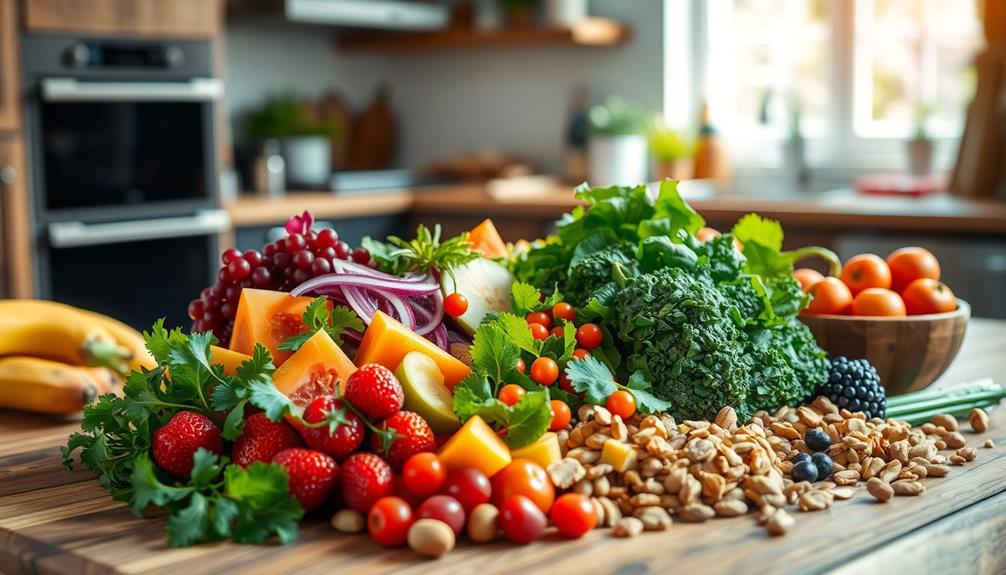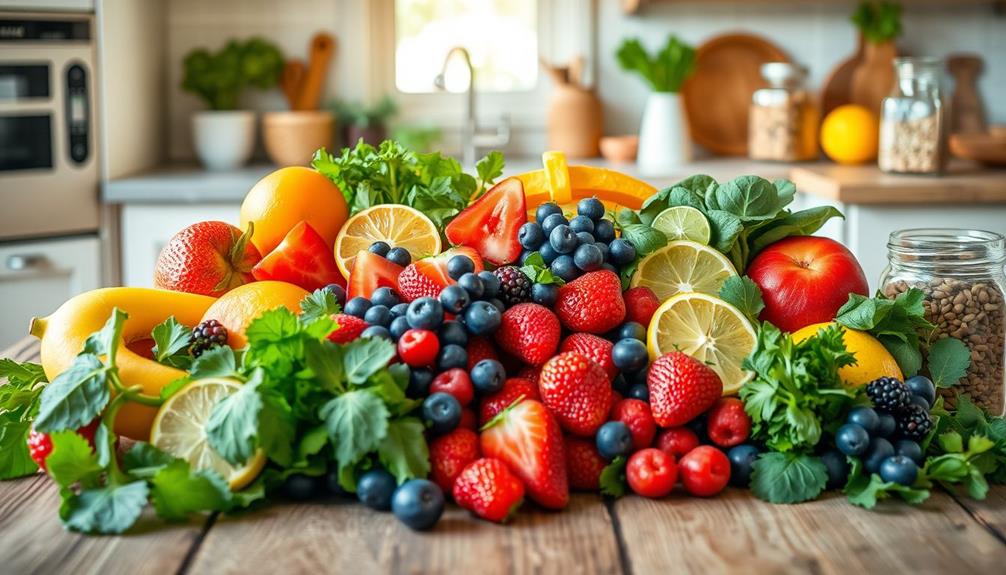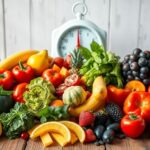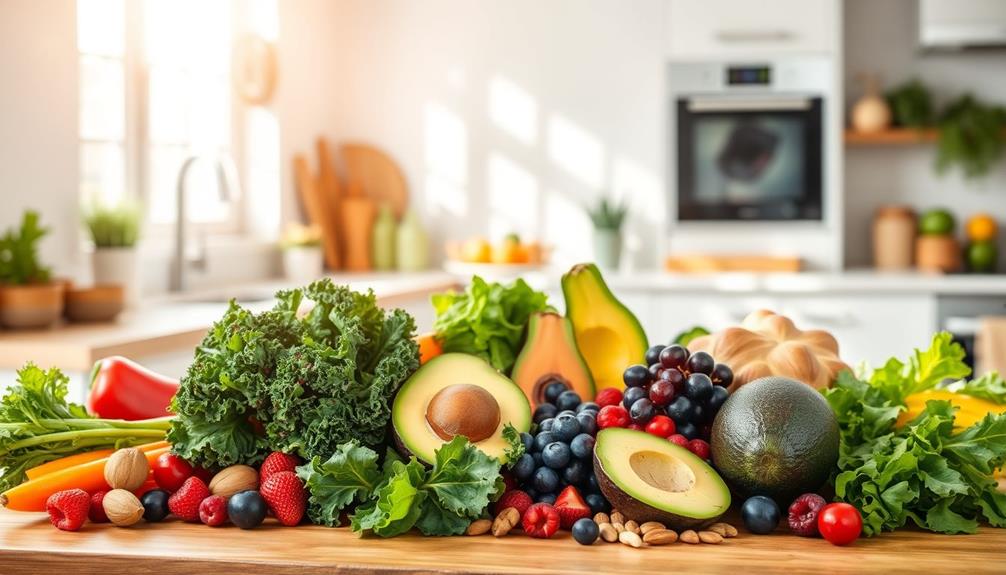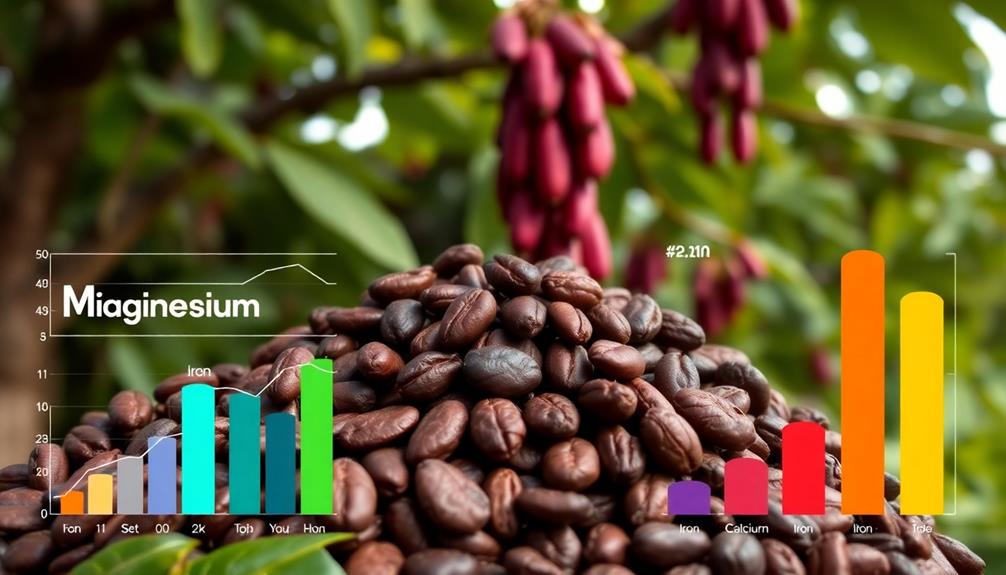Eating raw food can help you lose weight, primarily due to its low-calorie, high-fiber nature. By focusing on uncooked fruits, vegetables, and nuts, you may feel fuller and consume fewer calories overall. Short-term weight loss is often noted, but risk factors like nutritional deficiencies can arise from strict adherence to this diet. While many experience initial success, the long-term sustainability can be challenging. To maximize benefits and minimize risks, it's essential to plan your meals carefully. Curious about how to make the raw food lifestyle work for you? There's plenty more to discover about it!
Key Takeaways
- The raw food diet promotes short-term weight loss due to lower calorie intake from high-fiber, low-calorie foods like fruits and vegetables.
- Studies show raw food dieters often have lower Body Mass Index (BMI) and report average weight loss over time.
- Nutrient deficiencies, particularly in vitamin B12 and calcium, can occur with strict adherence to raw food diets, impacting overall health.
- Cooking can enhance nutrient absorption, suggesting a balanced approach may be more beneficial for long-term weight management.
- Meal planning and monitoring essential nutrients are crucial for sustained weight loss and health on a raw food diet.
Understanding the Raw Food Diet
The raw food diet emphasizes consuming uncooked, unprocessed foods, typically making up 75-80% of your meals with plant-based items. This approach focuses on raw fruits and vegetables, nuts, and seeds, ensuring you get maximum nutrients. Many people following a raw vegan diet avoid processed foods entirely, believing that cooking destroys vital enzymes and nutrients.
Additionally, incorporating foods like celery juice can provide anti-inflammatory benefits that align well with raw food principles. While the diet originated in the late 1800s and is often associated with various health benefits, such as improved digestion and potential weight loss, scientific evidence supporting these claims remains limited.
You might find that using tools like blenders and food processors can help you prepare delicious meals while sticking to the principles of the raw food diet.
However, it's crucial to be cautious. While short-term weight loss can occur due to lower calorie intake, this diet might lead to nutritional deficiencies over time, especially if you don't balance your meals properly.
Some variations of this diet allow for raw animal products, but most adherents lean toward a completely plant-based approach. If you're considering this lifestyle, make sure you monitor your nutrient intake to avoid potential health risks.
Weight Loss and Raw Foods

Adopting a raw food diet can lead to short-term weight loss due to its lower calorie intake. Many people experience this weight loss because raw food diets often rely on calorie restriction, which can be beneficial initially. Research shows some dieters have lost significant weight, like the participants in a 1985 study who shed an average of 8.4 lbs over 6.7 months.
Additionally, incorporating a variety of fruits and vegetables can provide vital nutrients, which are often emphasized in natural remedies alongside conventional medications.
Here are three key aspects of weight loss on a raw food diet:
- Lower Body Mass Index (BMI): A 2022 study found individuals on raw food diets had the lowest BMI, with many classified as underweight.
- Dietary Focus: Emphasizing raw fruits and vegetables can help you feel full while consuming fewer calories.
- Short-Term Effects: While you might see quick results, the restrictive nature of raw food diets can lead to nutritional deficiencies and health risks, making long-term sustainability challenging.
While short-term weight loss is achievable, it's important to reflect on the potential drawbacks. Finding a balanced, plant-based diet that you can maintain is vital for lasting weight management.
Nutritional Benefits and Risks
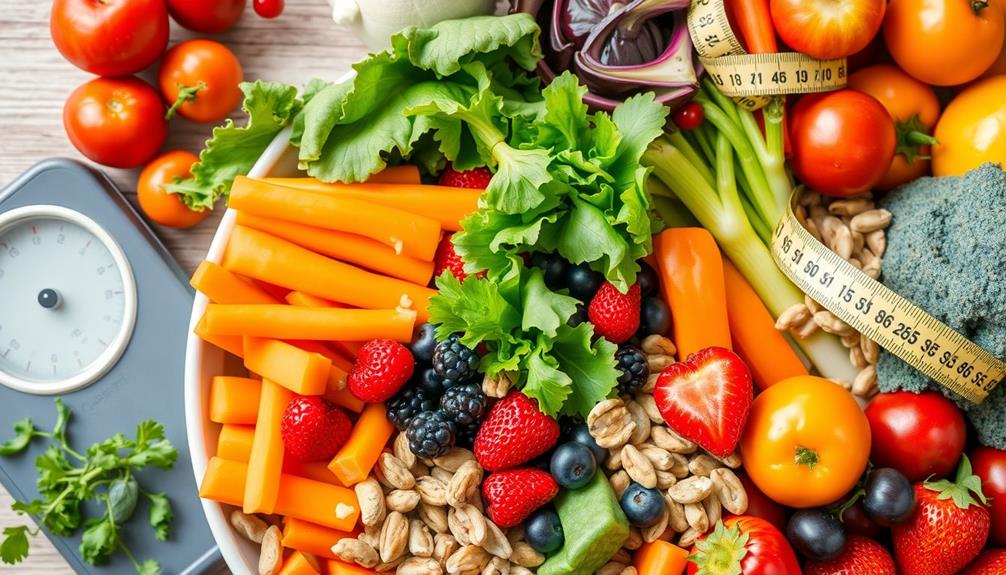
While a raw food diet can offer impressive nutritional benefits, it also comes with significant risks that you should consider. This diet tends to be low in calories, which might lead to short-term weight loss, but its restrictive nature can hinder long-term sustainability.
Many strict raw food dieters face nutritional deficiencies, particularly in vitamin B12, calcium, and vitamin D, essential nutrients for overall health and effective weight management. Additionally, incorporating balanced diet principles can help prevent these deficiencies and support overall well-being, as outlined in effective strategies for weight loss.
The high fiber content in raw foods supports digestive health and can enhance feelings of fullness, contributing to weight loss. However, long-term adherence to a raw food diet may result in underweight issues; studies show that around 19% of raw food eaters fall into this category.
This highlights the need for careful planning to avoid nutritional imbalances and health issues that can arise from insufficient calorie intake.
Cost and Accessibility Factors
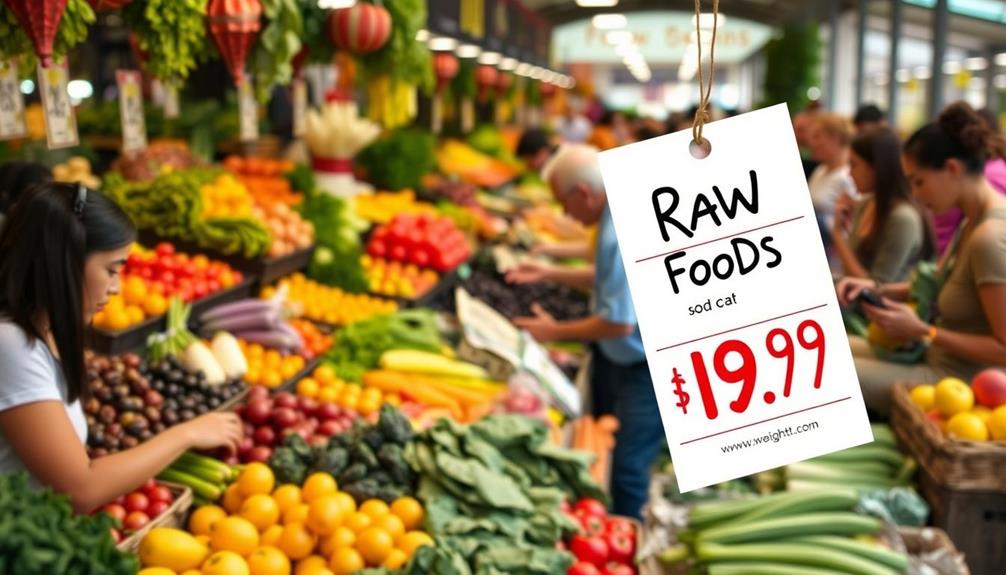
Maneuvering the cost and accessibility factors of a raw food diet can be challenging for many. You'll likely notice that organic ingredients can greatly hike your grocery costs, making it vital to find ways to save. Understanding your overall budget is essential in this process.
Here are three strategies that can help:
- Bulk buying: Purchase staple items like nuts, seeds, and grains in bulk to reduce costs over time.
- Seasonal produce: Focus on fruits and vegetables that are in season. They're not only fresher but also cheaper.
- Essential kitchen appliances: Invest in appliances like blenders and dehydrators, which can range from $100 to $600. While a hefty upfront cost, they're key for effective food preparation.
Dining out can complicate meal accessibility, as many restaurants have limited raw options.
Plus, the time-intensive preparation required for soaking, sprouting, and dehydrating can deter you from fully committing, impacting your adherence to the raw food lifestyle.
Balancing these factors is essential to make the raw food diet work for you while keeping costs manageable and ensuring you enjoy the benefits without feeling overwhelmed.
Expert Perspectives on Raw Diets

Steering through the complexities of a raw food diet raises questions about its long-term viability and health implications. Experts generally agree that while a raw food diet can lead to short-term weight loss through calorie restriction, sustaining such a restrictive nature often proves problematic.
Many individuals, including those in a 2022 study, found that strict adherence could lead to serious health risks, with 19% classified as underweight. Additionally, the lack of cooked foods may limit access to certain essential nutrients that are better absorbed when cooked, making it vital to contemplate incorporating a variety of essential oils for health benefits alongside dietary choices.
Medical professionals highlight that the total exclusion of cooked foods can impair nutrient absorption, creating potential nutritional deficiencies. Although increasing your intake of raw fruits and vegetables is beneficial, the absence of cooked options may hinder overall nutrient balance. This imbalance can exacerbate the risk of disordered eating patterns, as the restrictive nature of the diet may lead you to obsess over food choices.
While some participants in a 1993 study lost an average of 9% of their body weight, experts caution that the long-term effects mightn't align with weight management goals.
Ultimately, understanding these expert perspectives can help you make informed decisions about whether a raw food diet is right for you.
Starting a Raw Food Lifestyle

Embracing a raw food lifestyle means filling your plate with an abundance of fresh fruits, vegetables, nuts, seeds, and sprouted grains, with at least 75% of your diet coming from these raw or minimally cooked foods. This commitment can lead to weight loss, but it requires careful meal planning to guarantee you're meeting your nutritional intake.
Understanding the impact of different food preparation methods can enhance your health journey, as some methods may retain more nutrients than others, making your meals more beneficial for weight loss understanding coffee brewing methods.
To successfully start your raw food diet, focus on:
- Essential Kitchen Tools: Equip yourself with a blender, food processor, and dehydrator to create diverse meals that keep you excited about your food choices.
- Online Communities: Engage with fellow raw food enthusiasts for support, inspiration, and recipes that can help you navigate this lifestyle.
- Nutritional Monitoring: Be vigilant about the essential nutrients you might miss, such as vitamins B12, D, calcium, and protein, to maintain a balanced diet.
Transitioning to a raw lifestyle can be rewarding, but it requires dedication.
Cooking Vs. Raw Food Claims
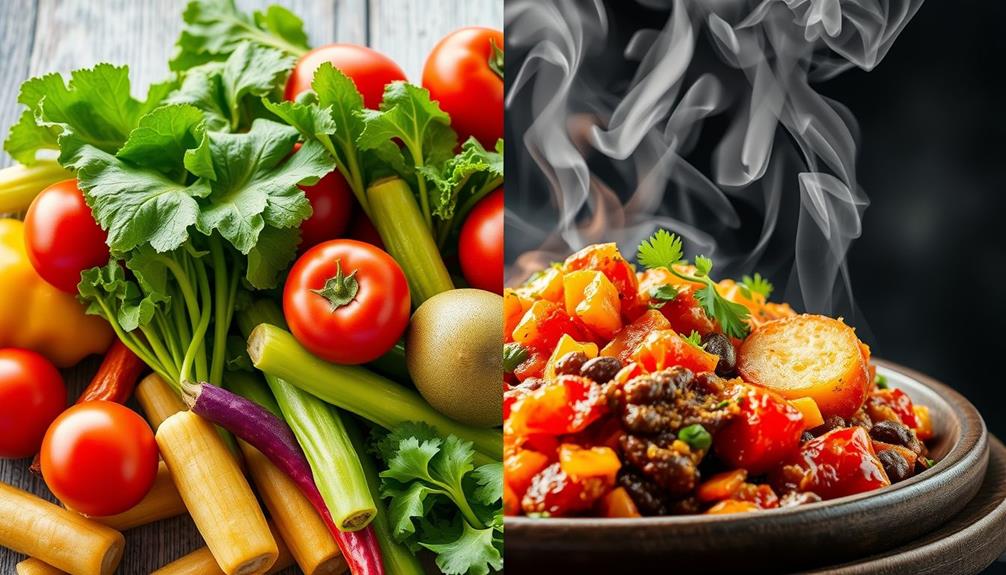
When considering the cooking versus raw food debate, it's essential to understand how each method affects nutrient preservation.
While raw food advocates argue that cooking destroys important enzymes, research shows that cooking can actually enhance the absorption of certain nutrients.
Additionally, raw foods often promote weight loss through their low-calorie, high-fiber content, making them a popular choice for those looking to manage their weight.
You'll want to weigh the benefits of each approach to find what works best for your health and weight management goals, especially since the safety of raw food diets is an important consideration.
Nutrient Preservation Debate
While many raw food advocates argue that cooking diminishes nutrients and enzymes essential for peak health, the scientific community presents a more nuanced view. Here are three key points to reflect on about nutrient preservation in the raw food diet versus cooking:
- Nutrient Loss vs. Bioavailability: Cooking can actually enhance the bioavailability of certain nutrients, like lycopene in tomatoes, making them easier for your body to absorb. Additionally, understanding the psychological factors influencing eating habits, such as those seen in individuals with BPD, can play a role in dietary choices.
- Digestive Benefits: Some raw foods contain compounds that can hinder nutrient absorption. Cooking can break down these compounds, facilitating better digestion and nutrient uptake.
- Caloric Intake and Weight Loss: The raw food diet is often linked to lower caloric intake, which may lead to short-term weight loss. However, this doesn't necessarily equate to superior nutrient preservation.
Despite the claims that raw foods can cure chronic diseases or dramatically improve health, robust scientific evidence is lacking.
Ultimately, increasing your intake of fruits and vegetables is beneficial, whether raw or cooked. Focusing on a balanced approach that includes a variety of cooking methods may provide you with the best nutritional benefits.
Cooking Health Benefits
Cooking offers numerous health benefits that often get overshadowed by the focus on raw food diets. When you cook your food, you enhance the bioavailability of certain nutrients. For example, cooking tomatoes increases the accessibility of lycopene, which your body can absorb more easily.
Additionally, cooking methods can help eliminate harmful bacteria and parasites that may be present in raw foods, ensuring safer consumption. Contrary to popular belief, cooking doesn't destroy nutrients; in fact, it can aid digestion and improve absorption of essential nutrients like iron and calcium.
Optimal comfort in varying weather conditions enhances living quality, just as a balanced diet can improve overall health.
Research shows that individuals strictly adhering to raw food diets may face nutritional deficiencies, particularly in vitamin B12 and iron, which are more abundant in cooked foods. A 2005 study even indicated that raw food dieters exhibited lower bone mass, highlighting potential risks associated with long-term raw food consumption.
While increasing your fruit and vegetable intake is beneficial, a strictly raw diet can lead to disordered eating patterns and nutritional imbalances. By incorporating cooked foods into your meals, you can enjoy the health benefits of improved digestion and nutrient absorption, helping to prevent nutritional deficiencies while still maintaining a balanced diet.
Emphasizing cooking alongside raw foods can create a healthier approach to eating.
Real-Life Experiences and Tips
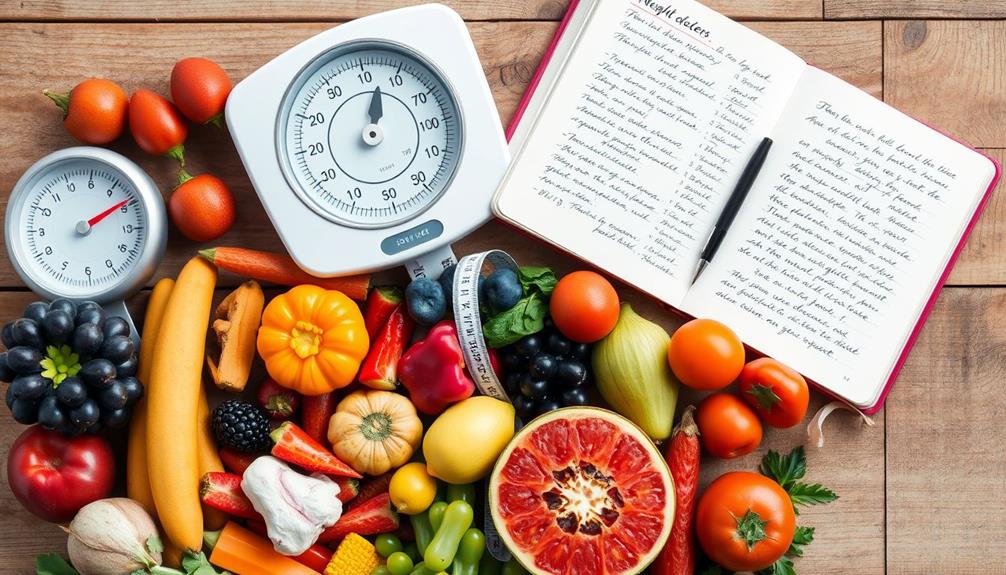
You might find inspiration in personal success stories from those who've embraced a raw food diet for weight loss.
Practical meal preparation tips can help you streamline the process and overcome common challenges.
Let's explore how real experiences can guide you on your journey to healthier eating.
Personal Success Stories
Many people who've embraced a raw food diet share remarkable success stories that highlight their transformative journeys. These personal testimonies often reveal significant weight loss and newfound vitality.
Many find that incorporating whole unprocessed foods leads to improved digestion and higher energy levels, and some have also discovered methods to enhance their overall wellness, such as practicing yoga for back pain alongside their dietary changes.
Here are a few common themes from their experiences:
- Weight Loss: On average, individuals report losing 22-26 pounds over 3.5 years, thanks to lower calorie intake from raw foods.
- Nutrient Intake: Success stories emphasize the benefits of consuming a variety of raw fruits and vegetables, ensuring a rich nutrient intake.
- Meal Prepping: Participants recommend meal prepping with tools like dehydrators and blenders to create satisfying, nutritious meals that prevent cravings.
While these successes are inspiring, it's essential to maintain a balanced approach.
Many participants stress that while short-term weight loss is possible, focusing on overall health and ensuring adequate nutrient intake is critical for long-term success.
Practical Meal Preparation Tips
In the world of raw food diets, practical meal preparation is key to success. To thrive, you'll need to hone your advanced kitchen skills. Investing in quality blenders and dehydrators is essential for creating delicious smoothies, raw pasta, and crunchy snacks.
Additionally, understanding the importance of financial considerations for elderly care can help you allocate your budget effectively while exploring nutritious meal options. Meal planning is vital; set aside a few hours each week for chopping, blending, and dehydrating your ingredients.
Soaking and sprouting grains and legumes can greatly enhance nutrient absorption and digestibility, making your meals more beneficial. Keep your pantry well-stocked with fresh fruits, vegetables, nuts, and raw condiments. This not only streamlines your meal preparation but also helps you stick to your raw food diet.
Don't forget the importance of seasonal produce! Buying in bulk during peak seasons can reduce costs associated with often pricey organic ingredients.
Overcoming Common Challenges
Steering the raw food journey can present several challenges, especially when trying to maintain motivation and adherence to the diet. To successfully navigate these hurdles, consider the following tips:
1. Meal Prep Organization: Set aside time each week to prepare your raw meals. This not only saves time but also helps you stay on track with your calorie intake.
Look for easy raw food recipes that can be made in bulk.
2. Budgeting for Ingredients: Organic ingredients can be pricey, but buying in bulk and opting for seasonal produce can greatly reduce costs.
Keep an eye out for local farmers' markets to save money while supporting local agriculture.
3. Dining Out Strategies: Research restaurants in advance that offer raw food options.
This way, you won't feel pressured to stray from your raw food diet when you're out with friends.
Engaging with online communities can provide valuable support and encouragement, helping you overcome challenges.
Sharing experiences and discovering new raw food recipes can keep your motivation high, making your weight loss journey enjoyable and sustainable.
Frequently Asked Questions
Does Eating Raw Food Make You Lose Weight?
Eating raw food can help you lose weight initially, as you're likely consuming fewer calories. However, sticking to it long-term may be tough, and you could face nutritional deficiencies that hinder sustainable results. Maintaining a balanced and varied diet is essential for overall health, and a strict raw food diet can be difficult to sustain. It’s important to incorporate other healthy foods and ensure you’re getting all necessary nutrients. Additionally, pairing a raw food diet and exercise can help you achieve lasting weight loss results and improve your overall fitness.
How Fast Can I Lose Weight on a Raw Vegan Diet?
You might worry about sustainability, but on a raw vegan diet, you can lose weight relatively quickly. Many experience noticeable results within weeks, especially if you focus on whole, unprocessed foods and maintain portion control.
Is There Any Science Behind Raw Diets?
Yes, there's science behind raw diets. Studies show they can lead to weight loss and lower BMI. However, they often cause nutrient deficiencies, making long-term adherence difficult and potentially harming your overall health.
How Much Weight Do You Lose on a Raw Diet?
Think of a butterfly emerging from its cocoon. You might lose 22-26 pounds over 3.5 years on a raw diet, with short-term results often tied to calorie restriction rather than just the foods you eat.
Conclusion
In summary, embracing a raw food diet might just be the key to revealing a healthier, slimmer you! While it offers numerous nutritional benefits, it's important to weigh the risks and costs. Remember, not every raw food claim is as golden as it sounds. If you're ready to plunge into this vibrant lifestyle, start small and build your way up. Who knows? You could be the next raw food guru inspiring others to transform their lives!

